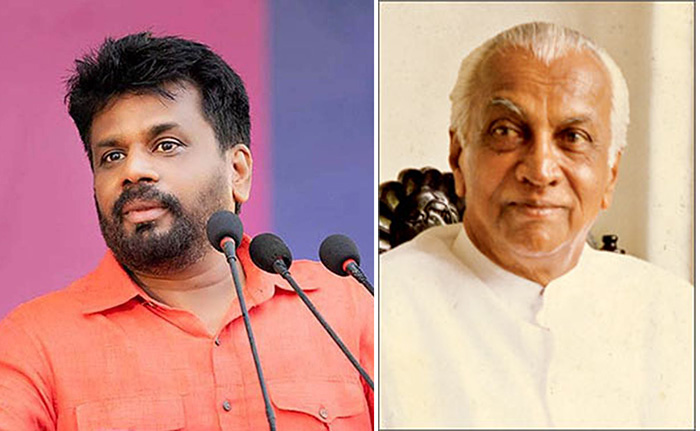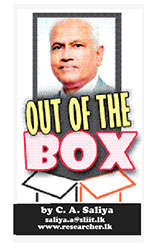DB and AKD

AKD and D. B
 Anura Kumara Dissanayake (AKD), the National People’s Power coalition candidate, has been elected Sri Lanka’s ninth President. Although he did not secure the required 50% plus one vote for outright victory, Dissanayake led with 42.31% of the votes, 1.3 million ahead of his nearest rival, Sajith Premadasa of the Samagi Jana Balawegaya (SJB).
Anura Kumara Dissanayake (AKD), the National People’s Power coalition candidate, has been elected Sri Lanka’s ninth President. Although he did not secure the required 50% plus one vote for outright victory, Dissanayake led with 42.31% of the votes, 1.3 million ahead of his nearest rival, Sajith Premadasa of the Samagi Jana Balawegaya (SJB).
Dissanayake’s party, the Janatha Vimukthi Peramuna (JVP), had been waiting a long time for this opportunity, despite having only three MPs in parliament. A viral Facebook post from 2015, where Dissanayake stated, “They tried to bury us. They didn’t know we were seeds,” reflects the party’s resilience.
This election marked the first ever preferential vote count due to constitutional requirements, which created confusion during the counting process. Nevertheless, the campaign and polling proceeded without violence. Dissanayake’s initial lead in postal votes suggested a strong performance.
Despite this success, former Minister Champika Ranawaka noted that 58% of voters had voted against Dissanayake, highlighting the challenges ahead.
Dissanayake performed well in historically significant areas, even surpassing the votes of former President Gotabaya Rajapaksa in his stronghold of Hambantota. Conversely, the Tamil common candidate, P. Ariyanethiran, received just over 2.25 lakh votes, further complicating the political landscape for Tamil representation and unity.
Traits and personality
When D.B. Wijetunga unexpectedly assumed the presidency following the assassination of Premadasa in 1993, and successfully led the military campaign to clear the eastern regions during the civil war, his close associates humorously referred to him as “Doing Bloody Well,” playing on his initials, D. B. W. However, as time passed and Wijetunga began favouring his close allies, often using state banks to accommodate them, and showing a stubborn refusal to listen to advice, the same associates started referring to him as “Deaf and Blind Wijetunga.”
President Dissanayake has shown remarkable adaptability, even making decisions that contradict some of the principles he advocated during his election campaign. Dissanayake could be considered adoptable and keen even when it means making compromises on his earlier campaign promises. AKD embodies the qualities of being adaptable, keen, and dynamic and navigates life with remarkable flexibility but also approaches challenges with enthusiasm and energy.
It is crucial for President Dissanayake to consult rela experts when making decisions. Unlike Gotabaya Rajapaksa, who sought advice from medical practitioners and monks on agricultural issues, Dissanayake should ensure that his decisions are informed by subject-matter experts who are well-versed in the complexities of the issues at hand. This approach will help Dissanayake maintain a dynamic and effective leadership style, avoiding the pitfalls of poor decision-making and ensuring sustained progress for the country.
DBW and Personal Success Attributes
The DBW concept emphasises action, perseverance, and excellence, showcasing remarkable success despite challenges. Together, these perspectives highlight different facets of excelling in various contexts; the “bloody” aspect of DBW signifies grit and determination. This intensity indicates that individuals do not merely perform adequately; they push boundaries and surpass expectations. Here, the critical difference emerges: while keenness emphasises a positive approach to learning and growth, the DBW perspective underscores the importance of perseverance in achieving success.
In the latter part of his presidency, Wijetunga’s ability to collaborate with Kumaratunga without undermining her government exemplifies the excellence inherent in his leadership. His choice to allow the political process to unfold without interference underscores a commitment to the democratic principles that characterised his tenure.
When qualities like adaptability, keenness, and dynamism are combined with the DBW mindset, they create a powerful formula for success. An individual who embodies these traits is flexible in responding to challenges, eager to learn from experiences, and dynamic in action.
AKD and his duty
President Dissanyake, 55, repesenting a transformative moment on the country’s political landscape, comes from a non-political family background, unlike previous leaders who hail from the political elite, notably the Rajapaksa and Premadasa dynasties. As the leader of the National People’s Power (NPP) coalition, a leftist alliance, Dissanayake’s rise to power follows the country’s worst economic crisis in more than seven decades, which triggered mass protests and the resignation of former President Gotabaya Rajapaksa in 2022.
Dissanayake, leader of the JVP, a party with a Marxist history and a reputation for violent uprisings in the past, has worked over the past decade to reform its image and present a platform focused on anti-corruption, transparency, and economic reform. His campaign centered around a “new era of renaissance” for Sri Lanka, promising to overhaul the entrenched political system plagued by corruption and mismanagement, which resonated with voters seeking drastic change in the aftermath of the country’s economic collapse.
His victory in the election was historic, not only for securing 43% of the vote but also because it was the first time in Sri Lankan history that a presidential election was decided by a second round of counting, as no candidate achieved an outright majority in the initial vote.
This victory is particularly notable given his marginal support of only 3% in the 2019 election, demonstrating the shift in public sentiment as Sri Lanka’s crisis deepened.
Despite his appeal to the electorate for change, significant concerns persist regarding his ability to unite the country. His party’s past association with Sinhala-Buddhist nationalism and opposition to Tamil rights has raised skepticism, particularly among the Tamil population, which represents about 12% of the country’s 22 million people. The JVP’s historical stance against Tamil aspirations, combined with its actions during past insurrections, may pose challenges in Dissanayake’s efforts to promote reconciliation and inclusivity.
Economic recovery is at the forefront of his agenda, and one of his first tasks will be to manage the austerity measures imposed under Sri Lanka’s $2.9 billion IMF bailout package. Dissanayake has expressed a desire to renegotiate some terms of the agreement, though experts caution that maintaining credibility with international creditors is vital to ensure the country’s financial stability. Navigating the debt restructuring process, currently in its final stages, will be essential for Sri Lanka to exit default status and restore investor confidence.
On the international front, Dissanayake’s presidency also faces significant geopolitical challenges. His historical anti-Indian rhetoric, including opposition to business agreements with Indian companies, could strain relations with India, a crucial neighbour that extended over $4 billion in aid to Sri Lanka during its economic crisis. Balancing these relations with China, which has also invested heavily in the island, will be a critical aspect of his foreign policy.
While his presidency brings the promise of transparency and reform, how he handles these domestic and international complexities will determine the success of his tenure. His ability to adapt, consult the right experts, and make pragmatic decisions—without becoming rigid or resistant to change, as his predecessors did—will be key in navigating the turbulent waters ahead.
Conclusions
President Dissanayake’s Marxist-rooted JVP has evolved under his guidance, yet the party’s history of violence and its past opposition to Tamil rights continue to raise concerns. Reconciliation with minority communities, especially the Tamil population, will be crucial for national unity and healing.
On the economic front, Dissanayake faces the immediate task of navigating austerity measures tied to Sri Lanka’s IMF bailout, while seeking to restore financial stability and regain the confidence of international creditors. Dissanayake’s presidency marks a significant shift in Sri Lanka’s political landscape, offering the promise of reform and recovery amid the country’s worst economic crisis. His leadership faces major challenges, including navigating IMF-imposed austerity, and balancing international relations with India and China. To succeed, Dissanayake must rely on adaptability, expert consultation, and pragmatic decision-making, avoiding the pitfalls of rigidity and poor governance seen in past leaders. His ability to unite the country and manage complex domestic and international issues will define his presidency.
(The writer, a senior Chartered Accountant and professional banker, is Professor at SLIIT University, Malabe. He is also the author of the “Doing Social Research and Publishing Results”, a Springer publication (Singapore), and “Samaja Gaveshakaya (in Sinhala). The views and opinions expressed in this article are solely those of the author and do not necessarily reflect the official policy or position of the institution he works for. He can be contacted at saliya.a@slit.lk and www.researcher.com)
-
Spin it for FREE. Win REAL $$$
